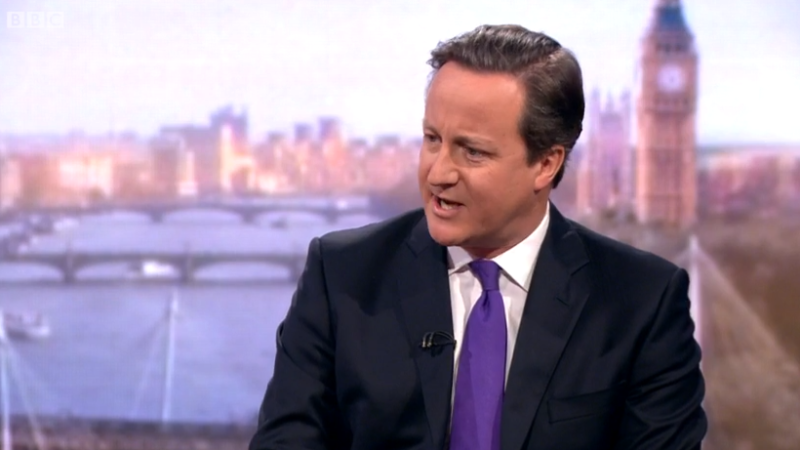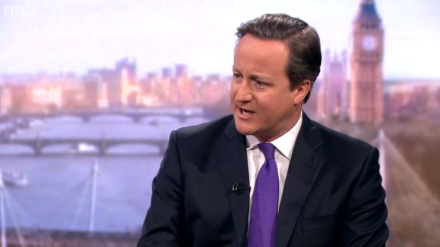
Speed kills. In an election campaign taking place in an ever-faster news cycle, with over-reaction piled on top of over-reaction, it will be hard to separate true facts from dramatic but misleading noise. Opinion polls will be at the heart of this process. Daily trackers and ramped-up instant reaction surveys will proliferate. Even as I started writing this last night, the latest ComRes poll (four point Con lead) came as a reminder not to get over-excited about any single poll that appears – for example Sunday’s YouGov poll, which registered precisely the same size lead… but for Labour.
I am reminded of the football correspondents who thought they had completed their match reports of the 1999 Champions League final in Barcelona – a one-nil win for Bayern Munich over Manchester United – only for United to score two goals in the three minutes of injury time the officials had awarded. Reverse ferret. Bloody hell.

The Sunday Times’ decision to make a big noise with their YouGov poll will have spoiled some Conservatives’ weekend. It came on top of one or two other signs that all is not well in the blue camp. Matthew Parris, who had declared a week earlier in his Times column that the Tories were heading for a clear and decisive victory(£), wrote in the same slot seven days later that actually his party was still unloved, and unappealing(£). A week is a long time in politics and an age in the outlook of the political columnist.
That same Saturday morning Charles Moore, in the Telegraph, pronounced that David Cameron was “too posh to push” for a Conservative victory, and that his laid-back manner revealed a personality that was essentially relaxed about and reconciled to losing. Two high priests of the Tory tribe were voicing their fears.
If the safest thing to say about the polls, as we enter April and the “short campaign”, is that the two main parties remain neck and neck, then that represents a small victory for Labour and a serious concern for the Conservatives. This was not how it was supposed to look by now. Lynton Crosby has been predicting a decisive “cross-over” in the polls for several months, and it still hasn’t happened. Better economic data have not shifted things. Voters are showing little gratitude. Perhaps they sense that growth in low-paid and unrewarding jobs is nothing to get too worked up about. And that falling petrol and supermarket prices, welcome and necessary though they are, have nothing to do with the government in any case. We pocket the gains and “re-baseline” our expectations. And still we feel, most of us, squeezed.
That is why the robust and combative performance from Ed Miliband in Thursday’s “Battle for Number 10” programme was so important and, from Labour’s point of view, so welcome. A pretty clear message was sent out: that Miliband was a battling leader who would stick up for voters’ interests. It is this role – the potential insurgent, the champion of the underdog – that could clinch those vital few extra votes Labour needs.
The Conservatives seem tempted to help Miliband play that part. Having admitted to Kay Burley on Thursday evening that some of his PMQ lines were a bit harsh and over the top, by Saturday Cameron was name-calling all over again. Iain Duncan-Smith agreed yesterday that if returned to office the Tories would carry out severe public spending cuts. He just wasn’t prepared, or able, to say what any of them were. The Tories simply repeat that they have a “long term economic plan”, but cannot say what this means in practice, how long term “long term” is, when we might all experience the benefits of this plan, and what their purpose in government is, other than trying to pay down a deficit they have failed to cut anything like as much as they said they would. This is a high-handed and unconvincing offer which, so far, is not being taken up.
Will voters want more of this sort of thing, or a change? Neck and neck poll ratings suggest a nil-nil draw rather than a decisive victory. Labour needs to score some late goals of its own.
They can do that by continuing to stand up for the underdog, the unfairly discriminated against, those who are not getting a fair chance. Maybe the tide is turning against the bullies and the undeserving rich. Maybe change is coming. There are some hopeful signs from the world of popular culture. Downton Abbey will not be commissioned for another series. Jeremy Clarkson has not had his BBC contract renewed. Perhaps Clarkson’s big mate, the prime minister, will be the next prominent figure to find out what it’s like not having your contract renewed.




More from LabourList
‘Factionalism at the top is weakening Labour – and handing a gift to Reform’
‘Europe must stand strong on its own as US security guarantees grow conditional’
‘Tackling poverty should be the legacy of Keir Starmer’s government’